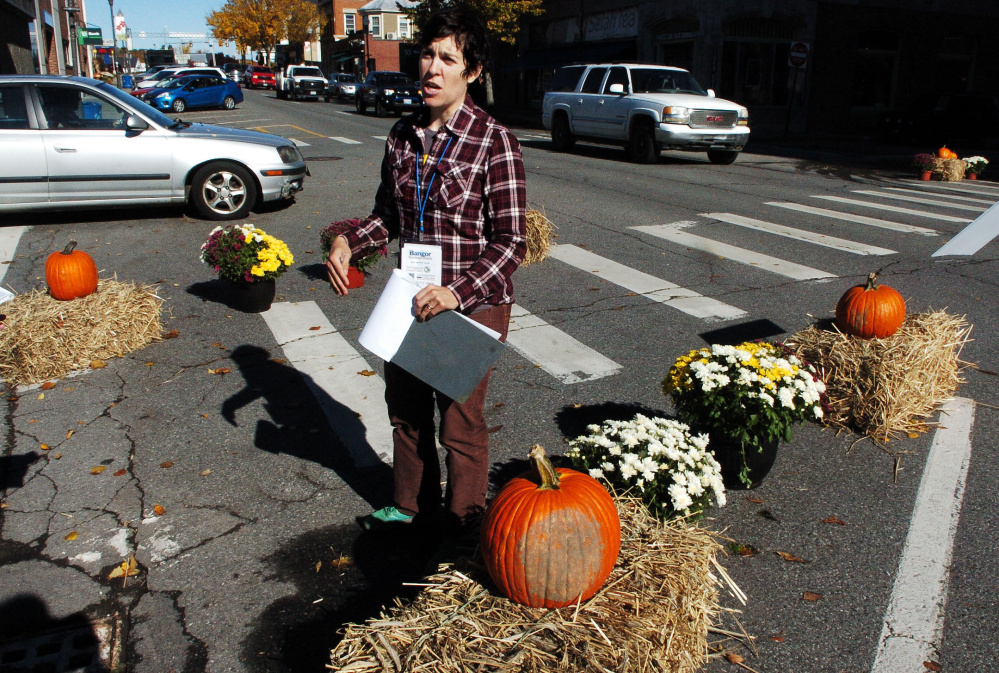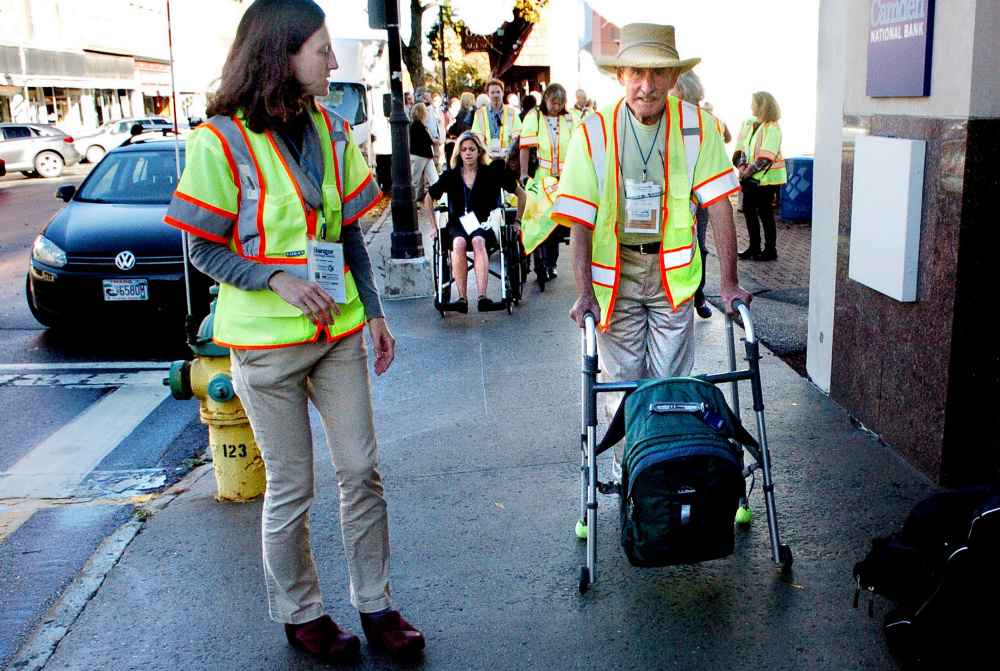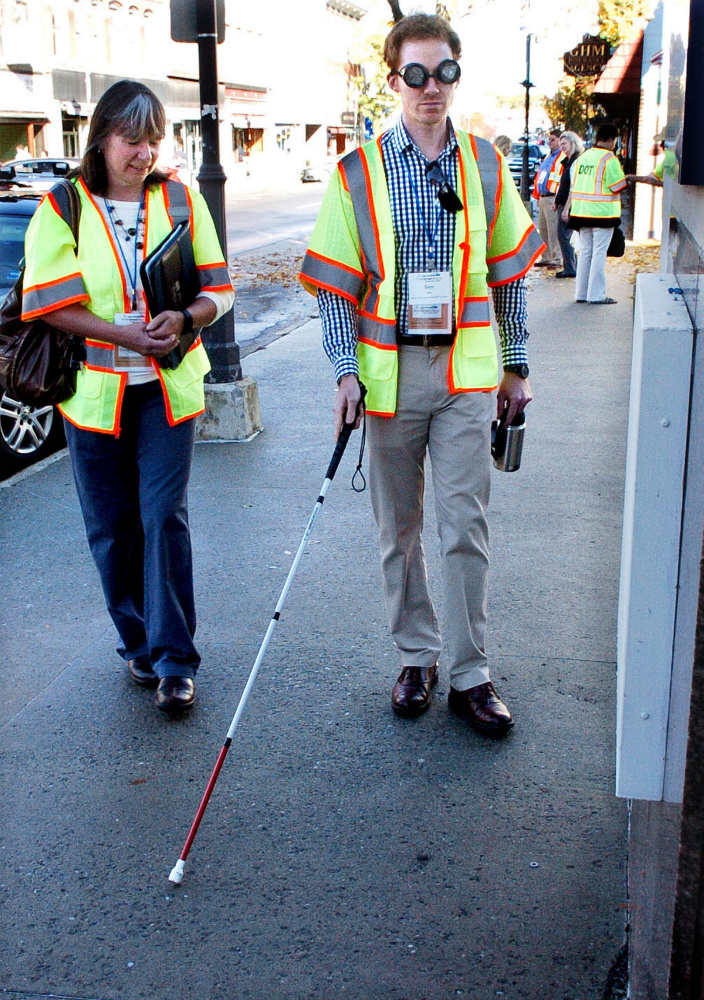WATERVILLE — What looked like colorful fall decor popped up Wednesday morning near busy intersections on Main and Front streets.
The hay bales, pumpkins and flowers weren’t just to celebrate fall, though. They were actually curb extensions, also known as “bump-outs,” used to increase pedestrian safety at crosswalks.
At the intersection of Front and Temple streets, the hay bales and pumpkins were set out just outside the curb. The extension served a few purposes, said Jim Tasse, assistant director of the Bicycle Coalition of Maine.
While the curb extension did not change the width of the driving lanes, they changed the perception of width, slowing traffic. They also forced cars to make better turns and provided space for pedestrians to step out farther and look for oncoming traffic, Tasse said.
“With just a few hay bales, you can see that instead of coming through here at 40 (mph), people are coming through at 25,” Tasse said.
The demonstrations around downtown were part of the morning session of GrowSmart Maine’s annual conference, which was held in Waterville this year. Carol Morris, vice president of the board of directors for GrowSmart, said the group likes to hold its conference in cities that are working to revitalize their downtown areas. Waterville has a number of downtown revitalization projects underway, which were further buttressed by the announcement Tuesday night of a $20 million fund from the Harold Alfond Foundation and Colby College.
Samantha Herr, the coalition’s community advocacy coordinator, was stationed Wednesday morning at the intersection of Appleton and Main streets, where the hay bales and flowers lined the crosswalk for the length of the parking bay.
With this simple and cost-effective solution, “the perception of safety is greater,” Herr said. It also has a “place-making” effect, making the experience of downtown happier and more enjoyable for people.
The third demonstration, which was in front of the Camden Pocket Park, let people see what it was like to be visually impaired or a wheelchair-user. Groups that partnered with GrowSmart let people put on goggles to impair their vision or use wheelchairs to get around.
“This is to raise awareness about what it’s like to live with a disability on the streets,” said Jill Johanning, an architect and access specialist at Alpha One, “about what it’s like to go get a cup of coffee every day using a wheelchair.”
GrowSmart Maine is a statewide organization based in Gardiner that works to preserve downtowns, agricultural land and forest land, among other things, Morris said. The objective is to keep “Maine the way people love it,” she said.
The organization covers a broad range of topics, including how to make downtowns more walkable and more accessible to people with disabilities.
For its afternoon session, GrowSmart hosted a panel at Thomas College on the changes in the workforce and how climate change affects downtowns.
Morris said the organization goes to downtowns that are going through a revitalization for its annual conference, and that she is “very impressed” with Waterville and what it’s doing.
“It’s great when the public and private sector work together,” Morris said. “Maine’s downtowns are a treasure.”
The board and partnering organizations that attended the conference also took walking tours around the area.
“I think that we’re seeing increasing excitement about renovating Maine’s downtowns, as well as Maine’s agricultural sector, and those are two things that can help Maine on the economic level,” Morris said. “So we’re feeling good about the trends we’ve been seeing.”
Madeline St. Amour — 861-9239
mstamour@centralmaine.com
Twitter: @madelinestamour
Send questions/comments to the editors.






Success. Please wait for the page to reload. If the page does not reload within 5 seconds, please refresh the page.
Enter your email and password to access comments.
Hi, to comment on stories you must . This profile is in addition to your subscription and website login.
Already have a commenting profile? .
Invalid username/password.
Please check your email to confirm and complete your registration.
Only subscribers are eligible to post comments. Please subscribe or login first for digital access. Here’s why.
Use the form below to reset your password. When you've submitted your account email, we will send an email with a reset code.